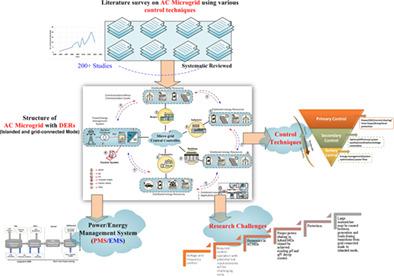当前位置:
X-MOL 学术
›
Int. Trans. Electr. Energy Syst.
›
论文详情
Our official English website, www.x-mol.net, welcomes your
feedback! (Note: you will need to create a separate account there.)
Recent control techniques and management of AC microgrids: A critical review on issues, strategies, and future trends
International Transactions on Electrical Energy Systems ( IF 1.9 ) Pub Date : 2021-07-21 , DOI: 10.1002/2050-7038.13035 Jaswant Singh 1 , Surya Singh 1 , Kripa Verma 2 , Arif Iqbal 1 , Bhavnesh Kumar 3
International Transactions on Electrical Energy Systems ( IF 1.9 ) Pub Date : 2021-07-21 , DOI: 10.1002/2050-7038.13035 Jaswant Singh 1 , Surya Singh 1 , Kripa Verma 2 , Arif Iqbal 1 , Bhavnesh Kumar 3
Affiliation

|
Distributed generation is considered as a key component of the emerging microgrid (MG) concept, enabling the integration of renewable sources in a distributed network. The MG has been accepted globally as a new approach that provides a flexible, reliable, sustainable, and economical solution for green and clean power generation. Microgrid is constituted by distributed energy resources (DERs) and is a combination of parallel connection equipped with suitable control and protection scheme for the operation in both islanded and utility grid-connected mode. Microgrid structure with various hierarchy control techniques is categorized into three layers such as primary control, secondary control, and tertiary control techniques. A comprehensive literature review of these control techniques in AC microgrid is presented. In addition, the technical challenges of existing MGs affect real-time applications around the globe. For the development and execution of various MG topologies, suitable power strategies are adopted to integrate distributed generation (IDG), energy storage system (ESS), and consumer loads for an improved energy management system (EMS). This paper presents a state-of-the-art review of recent control techniques of AC microgrids with DERs having various important aspects; hierarchical control techniques, management strategies, technical challenges, and their future trends in the system. Moreover, a comparative performance analysis of our proposed review with existing surveys of AC control techniques with their individual merits and demerits have been presented. Furthermore, this investigation of different power control techniques applied in MG is compared and classified in terms of various important features, highlighting potential advantages, and different applications.
中文翻译:

交流微电网的最新控制技术和管理:对问题、策略和未来趋势的批判性回顾
分布式发电被认为是新兴微电网 (MG) 概念的关键组成部分,能够将可再生能源整合到分布式网络中。MG 已被全球接受为一种新方法,可为绿色清洁发电提供灵活、可靠、可持续和经济的解决方案。微电网由分布式能源 (DER) 构成,是配备适当控制和保护方案的并联组合,可在孤岛和公用电网连接模式下运行。具有各种层次控制技术的微电网结构分为三级,即一级控制、二级控制和三级控制技术。介绍了交流微电网中这些控制技术的综合文献综述。此外,现有 MG 的技术挑战影响了全球的实时应用。对于各种 MG 拓扑的开发和执行,采用合适的电源策略来集成分布式发电 (IDG)、储能系统 (ESS) 和消费者负载,以改进能源管理系统 (EMS)。本文对交流微电网的最新控制技术进行了最先进的回顾,其中 DER 具有多个重要方面;分层控制技术、管理策略、技术挑战及其在系统中的未来趋势。此外,我们提出的审查与交流控制技术的现有调查及其各自的优缺点进行了比较性能分析。此外,
更新日期:2021-07-21
中文翻译:

交流微电网的最新控制技术和管理:对问题、策略和未来趋势的批判性回顾
分布式发电被认为是新兴微电网 (MG) 概念的关键组成部分,能够将可再生能源整合到分布式网络中。MG 已被全球接受为一种新方法,可为绿色清洁发电提供灵活、可靠、可持续和经济的解决方案。微电网由分布式能源 (DER) 构成,是配备适当控制和保护方案的并联组合,可在孤岛和公用电网连接模式下运行。具有各种层次控制技术的微电网结构分为三级,即一级控制、二级控制和三级控制技术。介绍了交流微电网中这些控制技术的综合文献综述。此外,现有 MG 的技术挑战影响了全球的实时应用。对于各种 MG 拓扑的开发和执行,采用合适的电源策略来集成分布式发电 (IDG)、储能系统 (ESS) 和消费者负载,以改进能源管理系统 (EMS)。本文对交流微电网的最新控制技术进行了最先进的回顾,其中 DER 具有多个重要方面;分层控制技术、管理策略、技术挑战及其在系统中的未来趋势。此外,我们提出的审查与交流控制技术的现有调查及其各自的优缺点进行了比较性能分析。此外,










































 京公网安备 11010802027423号
京公网安备 11010802027423号